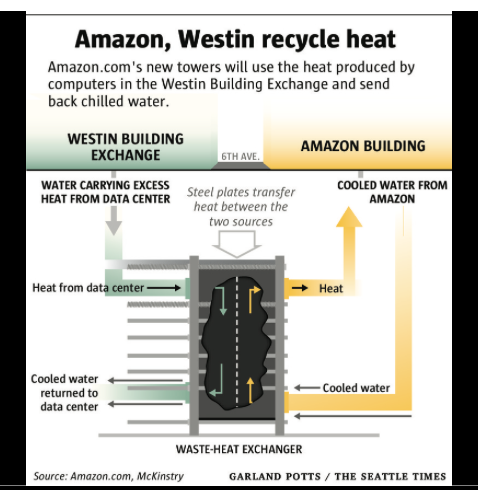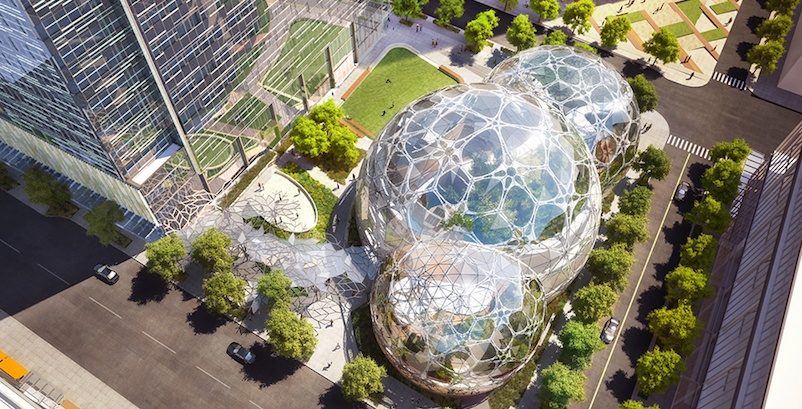Next month, Amazon.com is scheduled to open the first phase of its massive Denny Triangle campus in Seattle. Through a unique partnership, the spheres and towers that comprise Amazon’s four-block, 4-million-sf campus will be heated by waste heat recovered from the 34-story Westin Building Exchange across the street.
The Seattle Times reports that 70% of the Westin Building Exchange’s 400,000 sf is dedicated to data centers that are throwing off tremendous amounts of excess heat.
The building produces heat equivalent to 11 megawatts per day. Through an agreement with Pacific Northwest, which routes nearly all of its Internet traffic through the data centers in Westin, the building will transfer up to five megawatts to Amazon, which is purchasing the energy at a discounted rate. Recapturing this waste heat is expected to save about 4 million kilowatt-hours of energy per year.
Here’s how this system will work, according to the Times and the Seattle Post-Intelligencer: When the Amazon buildings need heat, that will signal two heat pumps that collect heat from the data centers in the Westin Building Exchange, and use it to heat water traveling via pipes from the roof of the Westin building and through its floors to a refrigerator-sized steel-plated heat exchanger in Westin’s basement.
 Image courtesy Amazon.com and McKinstry.
Image courtesy Amazon.com and McKinstry.
By the time that water reaches the exchanger, its temperature exceeds 70 degrees Fahrenheit. The exchanger transfers that heat through pipes running under the street to Amazon’s campus, which returns cooler water via the exchanger to the data centers.
When this system is fully functional, it will be circulating up to 3,000 gallons of water per minute.
Several entities collaborated on this project, which has been in the works for three years. They include McKinstry, which designed the heat-exchange system; and Clise Development, which co-owns the Westin Building Exchange with Digital Realty Trust, and sold Amazon the four blocks for its campus. Clise and McKinstry formed a partnership called Eco District for this project.
The agreement also involved several city agencies including its office of sustainability and environment. The Post-Intelligencer reports that one of Amazon’s building is already using this so-called district heating system that will ultimately provide heat for more than 3 million sf of office space.
Richard Stevenson, Clise Properties’ president, estimates the cost of this system in “the low millions” that would pay for itself in energy savings.
While heat exchange isn’t a new concept, it usually involves only one building, and rarely on the scale of this project. The Times quotes Susan Wickwire, executive director of the Seattle 2030 District—which aims to significantly reduce energy and water use in buildings in Seattle by 2030—who believes the arrangement between Amazon and Pacific Northwest could provide “a smooth path” for similar agreements where building occupants work together to save energy and make their operations more efficient.
“We’re showing people it can be done,” John Schoettler, Amazon’s director of global real estate, told the Times. “If other developments can model this, that’s a win-win.”
Amazon’s Denny Triangle campus, designed by NBBJ, will include three intersecting glass spheres that form a five-story office building, a 38-story tower, and 18,000 sf of retail. Amazon expects to be fully moved into these buildings in a couple of years.
Related Stories
| Nov 13, 2012
Turner Construction’s green building Market Barometer reveals new findings on green building and certification
Respondents indicated a widespread commitment to sustainable practices
| Nov 12, 2012
Legrand Shares New Energy Savings Resources Aimed at Promoting Better Energy Management
Company Announces the First in a Set of Comprehensive Resources to Help Companies Take Steps to Improve Energy Performance
| Sep 11, 2012
New York City releases first energy benchmarking data for private buildings
City is first in U.S. to disclose private-sector building energy data from a mandatory benchmarking policy.
| Jul 12, 2012
Chicago Public Schools names Lend Lease team as construction manager
Under this Capital Improvement Program, the Lend Lease team will be responsible for renovation and life safety work at over 100 Chicago Public Schools across the City.
| Jun 25, 2012
Living green wall planned for InterContinental Chicago
Project, with price tag of $2 million to $3 million, needs council approval.
| Jun 19, 2012
Energy and Commerce Departments Announce New Centers for Building Operations Excellence
Part of Better Buildings Initiative, Centers Will Focus on Energy Efficiency Workforce Development for Building Operations Professionals
| Jun 13, 2012
Steven L. Newman Real Estate Institute to hold energy asset conference for property owners, senior real estate managers
Top-level real estate professionals have been ignored as the industry has pushed to get sustainability measures in place.
| Jun 11, 2012
Historic church gains energy efficiency, retains aesthetics with architecturally rated windows
New windows would need to not only stand the test of time, but also accommodate the aesthetics of an architecturally historic church.
| Jun 11, 2012
SimplexGrinnell highlights integrated suite of web-based technologies at NFPA Expo
eservices platform uses the power of the Internet to deliver more value to customers.














